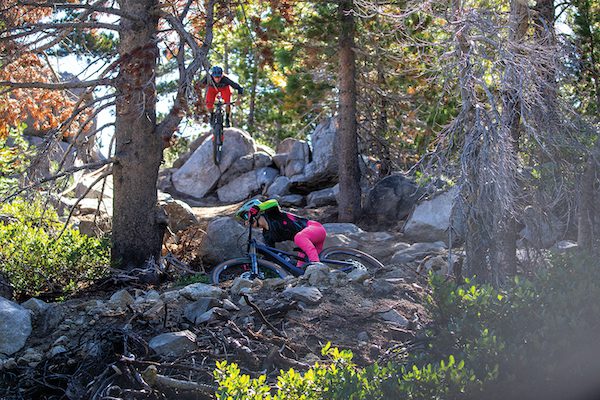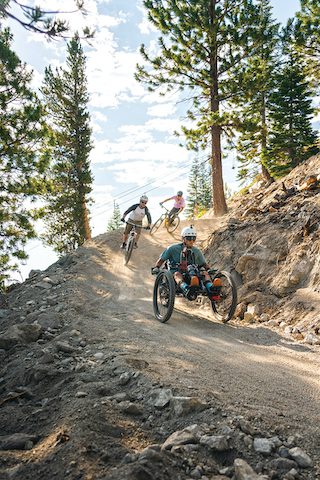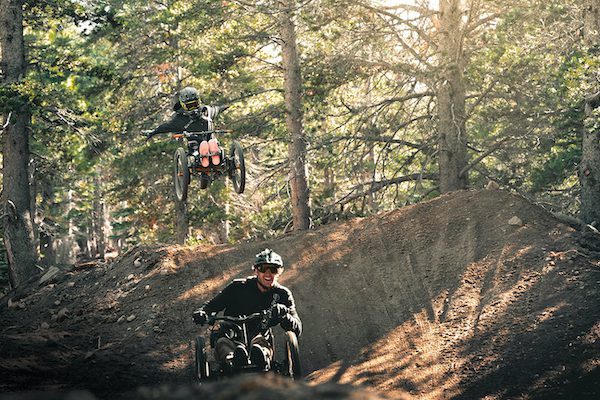
30 Apr Riders in the Sky
Sky Tavern builds on 75 years of skiing heritage with a first-class mountain bike park designed to accommodate athletes of all abilities
For generations, the community ski hill was where millions of Americans learned their first turns on snow. But in the modern era of mega-corporations, mergers and acquisitions, these cherished locations have become increasingly rare, with thousands of ski resorts across the country dwindling to a mere couple hundred.
Consider the Lake Tahoe region fortunate: The greater community still has a thriving ski hill in Sky Tavern, a City of Reno-owned park only 40 minutes from downtown.
Established in 1948, Sky Tavern has taught more than 125,000 youths the art of sliding on snow, providing a place for kids to participate in a sport their parents might not otherwise be able to afford. Boasting approximately 3,000 kids per year and 1,200 adult volunteers, the Sky Tavern Junior Development Ski Program is the oldest and largest youth ski program of its kind in the country.
Before 2019, Sky Tavern, a 501c3 nonprofit, struggled to expand beyond the status quo due to a three-year renewing lease with the City of Reno—a deterrent to long-term investment and fundraising. But five years ago, the Sky Tavern board of directors negotiated a 50-year lease, enabling the resort to raise an impressive $2.4 million that was put toward new snowmaking equipment and a $300,000 investment into building out its summer program focused on mountain biking.
“The lease changed everything,” says Yale Spina, Sky Tavern’s chairman of the board and grandson of resort co-founder Rocco Spina. “Now we have a chance to raise money to make infrastructure improvements and build a proper mountain bike park.”
As excited as Spina is about the winter program and new snowmaking equipment, he’s perhaps even more fired up about the considerable developments with the summer program over the last five years.
“As a kid, I’m glad I didn’t have to make a choice between skiing and mountain biking, because I would have chosen mountain biking,” says Spina, who enjoyed a successful career as a professional skier, stuntman and aerialist for almost 20 years.
Trail Building Chops
As a passionate cyclist, Spina searched nationwide to find the right person to build Sky Tavern’s mountain bike park. He couldn’t just hire any trail builder; Spina had to find the best. After interviewing 17 of the most qualified trail builders in the country, he decided on Steve Wentz of Reno-based Momentum Trail Concepts.

Daisy James leads the charge through a banked corner as Steve Wentz descends a granite slab on Sky Tavern’s Shark Bait Trail, photo by Ryan Salm
“There are a lot of good builders out there, but there are not very many artists,” says Spina. “Steve is someone who can really do something with nothing. You can’t believe the work he can do with an excavator.”
Since coming on board with Sky Tavern as the lead trail builder, Wentz has taken trails that were considered sketchy, rutted and loose and made them stable, durable and well-compacted, using literally tons of rock armoring on the trail tread, in berms and over jumps.
“The soil content here is decomposed granite,” Wentz says about Sky Tavern on episode 17 of Mind the Track Podcast. “The good news is that the dirt doesn’t just poof into the air like decomposed pine needles. The granite stays in the ground as long as you water it and keep it in place.”
And keeping soil in place is where the full water rights on Sky Tavern’s 165-acre parcel come into play—rights secured in the 50-year lease with the City of Reno that weren’t previously available. Using Sky Tavern’s new snowmaking infrastructure to irrigate the surfy and somewhat loose decomposed granite soil will keep the trails in prime condition all summer long.
Fun for All
But the real magic in Wentz’s deep toolbox of design is creating trail that can be fun for a wide range of riders with different skill sets. Wentz builds trail features with three options: right is safe and easy, middle is more challenging and left is senders only.
The progressive approach to Wentz’s design has also carried over to adaptive trails. Spina’s good friend Bob Vogel, a former professional skier and stuntman who suffered a spinal cord injury and lost the use of his legs, is an avid adaptive mountain biker.

Jason Abraham (front) rips down the High Fives Trail at Sky Tavern followed by Dylan Hagan and Sano Shishido, photo by Jordan Drew, courtesy Alpine Media
“Bob really likes riding his electric-assist adaptive mountain bike, but he was always relegated to boring dirt roads,” says Spina. “There’s got to be a way to build a flow trail that’s challenging and interesting enough for adaptive mountain bikes.”
A common misconception in mountain biking is that only narrow singletrack trails are fun, but Wentz bet he could build a wider, adaptive-friendly trail that mountain bikers would still want to ride. The result is the 2-mile-long High Fives Trail, a flow trail for intermediate riders designed specifically for adaptive mountain bikes.
Riding High Fives on my mountain bike with Wentz and Spina one August evening, I experienced the added width of the trail made for more playfulness when entering and exiting the high-speed, perfectly bermed corners. The trail did not ride like it was designed for adaptive mountain bikes; it rode like it was made for a mountain bike, regardless of whether it has two or four wheels.
“Building adaptive trails doesn’t mean the trails will be easier,” says Spina. “It just means wider, but still gnarly and fun.”
Spina sees Sky Tavern’s adaptive ski program as a model for creating an equivalent adaptive mountain biking program. He plans to rent out the highest-performance adaptive mountain bikes on the market. Because these specialized bikes can easily exceed $10,000, Spina wants to take down as many financial barriers as possible to get more adaptive athletes on the trail.
On other mountain bike-specific trails at Sky Tavern, like Rick Sutherland, College Boy and the brand-new Shark Bait, I experienced Wentz’s mastery of rock work. Huge granite boulders, some with long, flat edges making up the entire trail surface at times, were placed with absolute precision by Wentz, as if they were 2,000-pound puzzle pieces. All the features flow naturally, with tabletops that make riders feel weightless and granite dinner tables placed at the perfect transition angle. Clearly, Wentz is an avid rider. There’s no other way he could build such an intuitive and naturally flowing trail.
Eyes on the Future
The upcoming season will expand on the momentum of the past five years, particularly with the bike park.
“I consider last year to be a foundation-building year,” says Rick Reed, head of bike park development at Sky Tavern. “Our goal was to get awareness out there about all the new trails Steve has built, and to pull the community together, showing off this city park with an amazing location that’s open and free to the public.”
Based on the attendance at Sky Tavern’s Party in the Sky fundraiser in October 2023, word is out and the public is engaged. Reed says the plan for 2024 includes doubling the number of mountain bike skills clinics offered through Sky Tavern’s Riders in the Sky program, which launched last year and is designed specifically for women, youth and beginner riders of all ages.

Pierre Bergman with the no-hands air as Matt Tychsen leads the charge on the Rick Sutherland Trail, photo by Jordan Drew, courtesy Alpine Media
Another goal this summer is to raise enough funds for a progression skills zone, which would build riding skills and confidence with drops, tabletops and wooden features found at places like Truckee Bike Park and Sierra Vista in Reno.
“Our mission is to remove barriers of entry to the sport so people are encouraged to ride,” says Reed. “Other bike parks in the region that charge for lift tickets can be expensive and intimidating for new riders, discouraging participation. We want Sky Tavern to be an inclusive community hub open all season, with professionally built trails where people feel welcome.”
Raising money is central to these efforts, and last summer Sky Tavern launched its Ride for Five campaign. Riders who enjoy Sky Tavern’s trails and have the means to contribute are encouraged to donate $5 each time they ride. QR codes can be found all over the trail network, making it easy to chip in and support the program.
The public is also invited to all Sky Tavern events, including the MAYDAY Festival on May 19 at 10 a.m., kicking off the summer riding season with bike demos from Pivot and Rocky Mountain, games, food trucks, beverages from Reno’s Schussboom Brewing and a gear raffle. On October 13, Party in the Sky will provide another opportunity to participate and raise funds for the bike park, closing out what should be a successful 2024 season.
Beyond community events, Sky Tavern plans to use its property for ski and bike industry events, as well as weddings and company picnics. Grants are another way to fund expansion. In 2023, Sky Tavern was awarded a $75,000 grant by the Nevada Division of Outdoor Recreation to cover the cost of an excavator used for infrastructure projects.
New Blood
After 23 years of leadership, executive director Bill Henderson announced his retirement last fall. In February, Sky Tavern introduced Pat Cashell as the new CEO, a leader with deep family ties to Reno and a proven track record of community engagement. Chris Brown, who brings extensive experience managing ski and bike resorts across the Western U.S., will join Cashell in running day-to-day operations as COO and executive director.
Since 1948, Sky Tavern has created a model for youth development through skiing. With continued investment from the community, the next 75 years will establish Sky Tavern as a model for a sustainable community ski hill with year-round operations and a full-time staff. From fundraising strategies to new youth development opportunities—no matter what the idea—Spina welcomes it all with one word.
“The answer is ‘yes,’” says Spina. “Let’s figure it out and make it work.”
For more information on Sky Tavern and how to contribute, visit skytavern.org.
Kurt Gensheimer is a freelance writer and co-host of Mind the Track Podcast who has a passion for storytelling, trails and mountain biking. Follow him on Instagram, @trail_whisperer and @mindthetrack.




No Comments